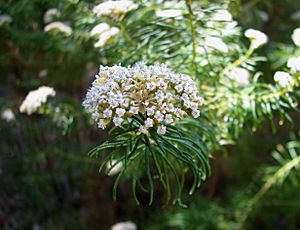Nunniong everlasting facts for kids
Quick facts for kids Nunniong everlasting |
|
|---|---|
 |
|
| Scientific classification | |
| Kingdom: | |
| (unranked): | |
| (unranked): | |
| (unranked): | |
| Order: | |
| Family: | |
| Tribe: |
Gnaphalieae
|
| Genus: |
Ozothamnus
|
| Species: |
O. rogersianus
|
| Binomial name | |
| Ozothamnus rogersianus (J.H.Willis ) Anderb.
|
|
| Synonyms | |
|
Helichrysum rogersianus J.H.Willis |
|
The Ozothamnus rogersianus, often called the Nunniong Everlasting, is a unique shrub from the Asteraceae family. This plant is found only in Victoria, Australia, making it a truly special part of the local environment.
Contents
Meet the Nunniong Everlasting!
This amazing plant can grow quite tall, reaching up to 2.5 metres high. That's like two and a half average-sized kids stacked on top of each other!
What Does It Look Like?
The Nunniong Everlasting has long, thin leaves. They are usually about 10 to 40 millimetres long and just 1 to 2 millimetres wide. The top side of the leaves is a bright green. But if you look underneath, you'll see they are covered with soft, fine white hairs. They also have a slightly sticky, yellowish sap or resin.
When Do Its Flowers Bloom?
This shrub produces pretty white flower heads. You can usually spot these lovely blooms from December to March. This is during the summer months in Australia, which is the perfect time for them to show off their beauty.
How Did This Plant Get Its Name?
The Nunniong Everlasting was first officially described in 1967. A botanist named Jim Willis gave it its first scientific name, Helichrysum rogersianum. He published his findings in a scientific journal called Muelleria.
The "rogersianus" part of its name is a special tribute. It honors a person named Keith Rogers from Wulgulmerang. Keith Rogers was the one who first discovered this plant. He found it growing at a place called Brumby Point on the Nunniong Plateau. This area is located in East Gippsland, a region in Victoria. Later, in 1991, scientists decided to move the species to a different group, or genus, called Ozothamnus.

